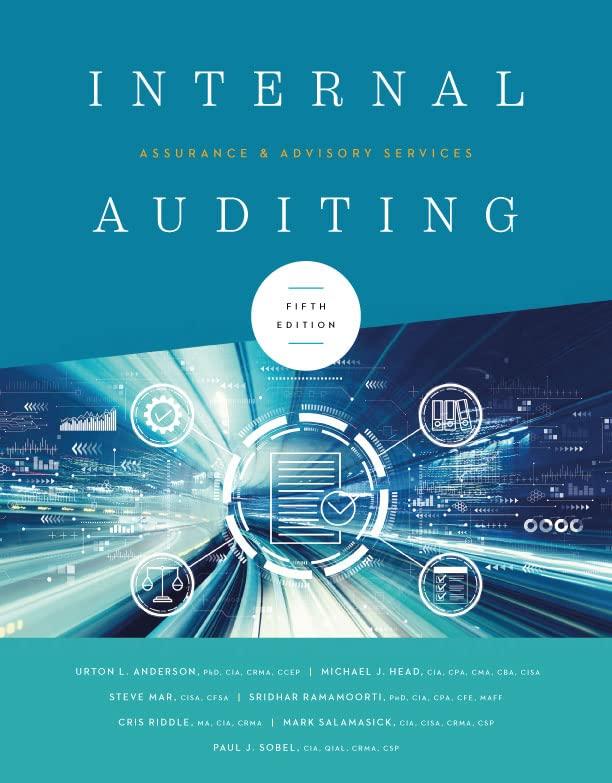Question
Terra Breads Bakery and Caf is a small, artisanal bakery in Vancouver. The bakery makes their loaves by hand using traditional methods. As stated on
Terra Breads Bakery and Caf is a small, artisanal bakery in Vancouver. The bakery makes their loaves by hand using traditional methods. As stated on their website:
It takes a little longer up to three days per loaf but it makes bread of exceptional flavour, texture, and nutritional value that you cant create any other way. For loaves like these, well wait as long as it takes.
From day one in 1993, weve made bread using the best, carefully selected, sustainable and non-GMO ingredients with a healthy obsession for perfection. We bake in stone hearth ovens and use French linen proofing cloth. Loaves are scored by hand with their signature mark. In fact, we can tell which baker scored each loaf as its a little like signing their work.
Most importantly, our sourdough starter links the loaves we make today with the ones we made decades ago. The essence of our breads their very flavour is carried through that link.
Loaves are still mixed, shaped and assessed with the touch of experienced bakers hands. Its the only way weve ever done it. And its the only way we know how.
Now that youre hungry, you can download the dataset on D2 entitled TerraBreads. The dataset provided has information on their revenues and expenses taken from a random sample of 30 weeks. The data includes data from three of their four locations.
The owners wish to first determine if there are significant differences in profits across the three locations. If there are significant differences, the owners will need to drill down further to see where other significant differences (e.g. revenues,expenses, overtime, etc.) might be contributing to the problem.
In your analysis consider ways to address any location that appears to be lagging behind. Options might include hiring more staff, laying off some staff, reducing or increasing staff hours, reducing the number of revenue categories (e.g. getting rid of a line of products). Base these recommendations on what you discover when running two population t tests on any variables that you feel are worth investigating.
Some definitions
Variable expenses:
For this investigation, we will not include the cost of products (flour, etc.), but we will include the cost of wasted product (damaged or discarded)
Hourly wages are $20 for regular time and $30 for overtime
Consider each store to be roughly the same size, with roughly the same number of clientele. Differences in staffing levels and overtime are due to management decisions (for better or for worse).
Fixed expenses:
Lease of building
Administrative costs
Advertising (web page maintenance, etc.)
You have no control over fixed coststhey are based on long-term lease agreements, employment contracts, etc.)
The assignment
Run a series of t tests (be sure you can justify which type of t tests you have chosen) to help the owners in addressing any possible causes for significant differences among the three locations.
Write a memo to the owners on your findings and recommendations.
What you will hand in
A completed set of Excel spreadsheets: pooled, unpooled, and paired t-tests. You should also include the test for normality that I gave you on D2L, as well as a spreadsheet for F tests. So, your spreadsheet should have five tabs for your master spreadsheets. Additional tabsclearly labeledwill be used for each of the tests you run. For each test, make a duplicate of the relevant master spreadsheet and insert the necessary data on the duplicate.
A one- to two-page memo report on your findings.
At least one visual (to be included in the memo report) and one table.
Steps
Start by running two population t tests on the profits to determine if there are any significant differences in profits among the three locations. You will need to justify which type of t test you use. (if any preliminary tests are required, conduct those as well).
Once you find any differences, start running t tests and confidence intervals on individual variables (e.g. compare waste expenses across the three locations to determine if one store in particular needs attention in that area). Do this for all the variables that you deem worth investigating.
Once you have found variables that need attention, create some descriptive statistics that allow a comparison of these variables across the locations.
Be sure you are able to interpret each measure in your report. For example, dont include a skewness coefficient unless you feel its relevant and can interpret it meaningfully. Compile these measures for all three locations into one table, to be included in your memo.
Also create one visual that will allow you to see some clear differences for one or more of variables chosen among the three locations. (If you feel you need more than one visual, you may include them in an appendix to the memo.)
Write a one- to two-page memo report on your findings. Be sure to include:Introduction:
Purpose and background of study
Methodology (how the samples were chosen; how the variables were chosen and why; what type of tests were conducted and why, including any discussion of preliminary tests and assumptions)
Discussion:
A summary of your findings written in non-technical language. (Do not include five step tests here; just include a summary of the results).
A visual that effectively illustrates your findings, as well as a table of relevant descriptive statistics.
Conclusion:
A one- or two-sentence restatement of your key findings
Your recommendations for actions to be taken
A brief discussion of the limitations of the study
Any recommendations for further study


Step by Step Solution
There are 3 Steps involved in it
Step: 1

Get Instant Access to Expert-Tailored Solutions
See step-by-step solutions with expert insights and AI powered tools for academic success
Step: 2

Step: 3

Ace Your Homework with AI
Get the answers you need in no time with our AI-driven, step-by-step assistance
Get Started


